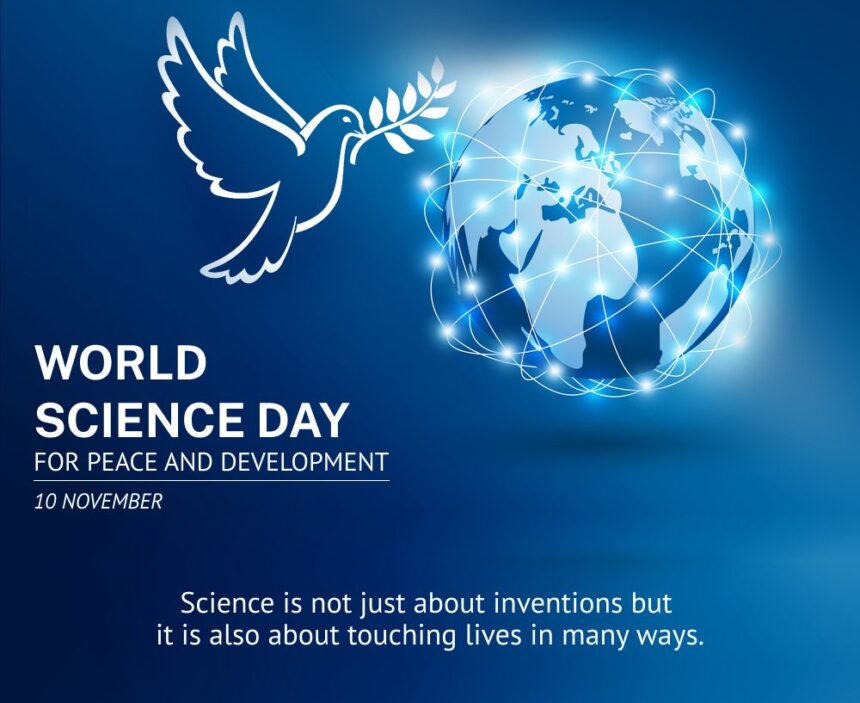🌍 Introduction: Celebrating Science Beyond the Lab
Every November 10, people around the globe celebrate World Science Day for Peace and Development—a reminder that science isn’t just about labs and formulas. It’s about life, peace, and solving real problems.
- 🌍 Introduction: Celebrating Science Beyond the Lab
- 📜 History of World Science Day for Peace and Development
- 📆 Timeline: Milestones of Global Scientific Collaboration
- 🔎 10 Fascinating Facts About World Science Day
- 🔬 Why This Day Matters: Significance in Modern Times
- 1. Bridging Science and Society
- 2. Empowering Peace
- 3. Sustainable Development
- 4. Crisis Response
- 5. Education & Inspiration
- 🧠 Frequently Asked Questions (FAQs)
- ❓ When is World Science Day observed?
- ❓ Who organizes it?
- ❓ What’s the purpose of the day?
- ❓ How is it different from National Science Day?
- ❓ Can students participate?
- 🌎 Observance Around the Globe
- 💬 World Science Day Wishes & Quotes
- 🌱 Daily Life Impact: Why It’s Relevant to You
- 📝 Key Takeaways and Important Points
- ✨ Conclusion: Why We Need to Protect and Promote Science
Whether it’s fighting disease, addressing climate change, or improving education, science forms the foundation of progress and human dignity. This day recognizes how scientific understanding empowers people and promotes global stability.
📜 History of World Science Day for Peace and Development
Proposed by UNESCO in 1999 and officially proclaimed in 2001.
It emerged from the World Conference on Science (1999) in Budapest, where the need for science to be more accessible, ethical, and peace-oriented was strongly emphasized.
The first official celebration took place on November 10, 2002.
🔍 Objective: To strengthen public awareness about the role of science and to bridge the gap between science, society, and sustainable development.
📆 Timeline: Milestones of Global Scientific Collaboration
| Year | Event |
|---|---|
| 1999 | World Conference on Science proposes international recognition of science |
| 2001 | UNESCO proclaims November 10 as World Science Day |
| 2002 | First global observance with public lectures and media engagement |
| 2015 | Linked closely with UN’s Sustainable Development Goals (SDGs) |
| 2020 | Focus on COVID-19, vaccines, and resilience through science |
| 2023 | Theme: “Building trust in science” |
🔎 10 Fascinating Facts About World Science Day
🌐 Celebrated in over 120 countries, including schools, labs, and science museums.
🧬 Ties closely with the 17 UN Sustainable Development Goals (e.g., health, water, climate).
📡 Encourages open access to scientific data, especially for developing nations.
🧠 Aims to correct science misinformation and boost public trust.
🏫 Schools host science exhibitions, fairs, and awareness talks globally.
🧪 UNESCO offers fellowships, grants, and awards on this day.
🤝 Encourages collaboration between scientists and communities.
🎓 Promotes STEM education, especially for girls and underrepresented groups.
🌿 Strong focus on climate science, renewable energy, and biodiversity.
✍️ Every year, UNESCO sets a new theme to guide global events.
🔬 Why This Day Matters: Significance in Modern Times
1. Bridging Science and Society
It promotes a culture where science is not elitist but inclusive, helping regular citizens understand and benefit from it.
2. Empowering Peace
From conflict zones to disaster areas, science can play a role in humanitarian response, resource management, and conflict prevention.
3. Sustainable Development
Supports innovations in clean energy, public health, agriculture, and sanitation—all crucial to SDG success.
4. Crisis Response
During the COVID-19 pandemic, science became our first line of defense—from data tracking to vaccine development.
5. Education & Inspiration
Inspires future generations to pursue science as a tool to improve their communities and solve global problems.
🧠 Frequently Asked Questions (FAQs)
❓ When is World Science Day observed?
November 10 every year.
❓ Who organizes it?
It is led by UNESCO, with contributions from schools, governments, universities, and NGOs worldwide.
❓ What’s the purpose of the day?
To highlight how science contributes to peace, sustainability, and human development.
❓ How is it different from National Science Day?
While National Science Days are country-specific (like India’s Feb 28), World Science Day is global in focus and emphasizes science’s role in world peace and development.
❓ Can students participate?
Absolutely! Many schools and universities organize science fairs, debates, innovation showcases, and awareness talks.
🌎 Observance Around the Globe
🏛️ Schools & Colleges:
Host science fairs, seminars, quiz competitions.
Encourage students to explore how science impacts daily life.
🧪 Scientific Institutions:
Organize open labs, TED-style talks, and public demos.
Launch new research findings or showcase ongoing projects.
📺 Media & NGOs:
Broadcast documentaries, podcasts, or social media campaigns.
Run awareness campaigns on climate change, pollution, and vaccines.
🧑⚖️ Governments:
Fund innovation projects, STEM scholarships, and promote scientific policy dialogues.
💬 World Science Day Wishes & Quotes
🌟 Inspiring Wishes:
“Let’s celebrate the minds that dare to ask ‘why’ and work toward a better tomorrow.”
“Science lights the way to peace and development—Happy World Science Day!”
“Here’s to science that heals, uplifts, and empowers every generation.”
💡 Notable Quotes:
“The science of today is the technology of tomorrow.” — Edward Teller
“Science is not only a disciple of reason but, also, one of romance and passion.” — Stephen Hawking
“Peace cannot be kept by force; it can only be achieved by understanding.” — Albert Einstein
🌱 Daily Life Impact: Why It’s Relevant to You
🧍 Personal Life:
Innovations in medical diagnostics, vaccines, and sanitation improve lifespan and quality of life.
Access to clean water, safe cooking methods, and digital education stems from scientific breakthroughs.
🏠 Family Life:
Science in everyday items: microwaves, mobile phones, medicines.
Ensures food safety, disease prevention, and energy saving appliances.
🧑🤝🧑 Society:
Encourages critical thinking in communities.
Builds trust in evidence-based decisions over superstition or misinformation.
Fosters global collaboration during crises.
📝 Key Takeaways and Important Points
📅 Date: November 10 every year
🌐 Founded by: UNESCO in 2001
💡 Purpose: Promote science’s role in peace, policy, and development
🧬 Celebrated in: 120+ countries
🧒 Focus on: STEM education, climate action, open science, equity
🧠 Theme changes yearly to reflect pressing global challenges
📣 Involves everyone—from researchers to students and everyday citizens
✨ Conclusion: Why We Need to Protect and Promote Science
In today’s polarized and rapidly changing world, World Science Day reminds us of one profound truth:
“Science isn’t just about discovering the world—it’s about building a better one.”
It urges us to place faith in facts, encourage evidence-based decisions, and nurture young minds who will solve tomorrow’s problems.
Whether you’re an educator, policymaker, or student, let this day be your call to respect, fund, and apply science—not just for discovery, but for dignity and peace.









Very nice post. I just stumbled upoon your weblog andd wished to say that I
have truly enjoyed browsing your weblog posts.
In any case I’ll bbe subscribing to ylur feed and I’m hoping you writte once mmore soon!